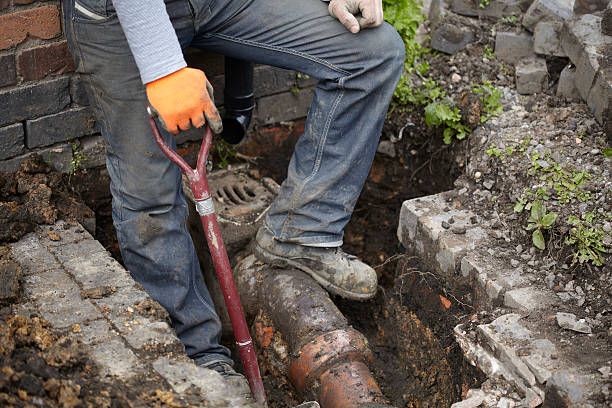The unsung heroes of contemporary infrastructure are sewer systems, which silently remove trash and maintain our houses and neighborhoods’ cleanliness and hygienic conditions. However, homeowners frequently need to pay more attention to sewage care until issues develop, despite its crucial function. Ignoring sewage maintenance can have far-reaching effects, from expensive property damage and health risks to inconvenient jams. In this post, we’ll examine the several consequences of skipping sewer maintenance and stress the significance of providing proactive care for these vital systems.
Knowing How to Maintain Sewers:
Before discussing the effects of neglect, it is critical to comprehend the requirements for sewer upkeep. Various tasks are included in sewer maintenance to maintain clear, hygienic, and operational sewer networks. This entails routine examinations, sewage line cleaning, obstruction removal, and necessary repairs. Maintaining their property might help homeowners avoid problems before they become emergencies.
The effects of skipping out on sewer maintenance
Clogged Toilets and Drains: One of the most obvious effects of skipping sewer maintenance is the development of clogged toilets and drains. Wastewater flow can become restricted in sewage systems due to accumulating debris, oil, and other materials over time. This causes the home to smell bad, have backed-up toilets, and slow drains. In addition to interfering with daily activities, clogged drains are signs of problems with the sewer system that need fixing.
Sewage Backups: Sewage backups are perhaps the most dreaded effect of improper sewer maintenance. Wastewater may return to sinks, bathrooms, and basements when sewage lines are seriously damaged or obstructed. Because sewage backups contain germs, viruses, and other pathogens, serious health hazards exist. After a sewage backlog, homeowners may experience additional difficulty and stress from the expensive and time-consuming cleanup and repair work.
Property harm: Both infrastructure and property can sustain significant harm from neglected wastewater systems. Water damage from sewage backups can affect walls, floors, and personal items, necessitating costly restoration and repair. Sewage exposure for an extended period can, in extreme circumstances, weaken the foundation and building’s structural integrity, causing instability and structural damage. Sewer backups can cause property damage, lowering a home’s value and putting inhabitants in danger.
Health Risks: Residents of impacted properties are at significant risk for major health problems due to sewage backlog and overflows. Numerous health issues, such as respiratory infections, skin irritation, and gastrointestinal disorders, can arise from sewage exposure. Sewage contains bacteria, viruses, and other pathogens that can move fast throughout the house, polluting surfaces and air. Children, older people, and people with weakened immune systems are among the vulnerable groups that are more vulnerable to the health hazards linked to sewage exposure.
Environmental Pollution: Broken sewer systems affect the outside world in addition to interior spaces. Endangering wildlife and aquatic habitats, sewage spills and overflows introduce hazardous chemicals and toxins into soil, waterways, and ecosystems. Sewage pollution can cause long-term ecological harm, ecosystem disturbances, and water contamination. Sewage spills can also be illegal under environmental laws, which could result in fines or penalties for property owners.
The Value of Preventive Sewer Upkeep
Homeowners must prioritize proactive sewer care due to the possible implications of neglect. Regular cleaning, maintenance, and repairs can assist in keeping sewer systems functioning and intact by preventing backups, obstructions, and property damage. The following are some main arguments in favour of proactive sewer maintenance:
Emergency Prevention: Preventive maintenance can detect possible problems early on and take action before they become serious. Homeowners may reduce the danger of sewage backups and property damage, save money on repairs, and avoid costly maintenance by routinely checking and cleaning their sewer lines.
Protection of Health and Safety: Ensuring the cleanliness and proper operation of the sewer system is essential to safeguarding the inhabitants’ health and safety. Residents live in a better environment when there is less chance of indoor air pollution, contamination, and sewage backups due to routine maintenance.
Preservation of Property worth: Well-maintained sewage systems add to a home’s overall appeal and worth. Homeowners may maintain their properties’ condition and resale value, drawing in potential buyers and guaranteeing a larger return on investment by eliminating sewage backups and property damage.
Respect for Regulations: Ensuring adherence to regional laws and ecological guidelines is facilitated by routine sewer upkeep. Property owners may be obliged to keep sewer systems in excellent operating order to avoid penalties or legal repercussions and to remedy any concerns swiftly.
In summary:
For households, neglecting sewer care can have major repercussions, such as clogged drains, sewage backups, and pollution of the environment. Homeowners may preserve the integrity of sewer systems, protect their houses, and protect their health by giving proactive maintenance priority and acting quickly when something goes wrong. Maintaining a clean, safe, and functional living environment requires investing in sewer maintenance through do-it-yourself projects or hiring professionals. Take proactive measures to maintain your sewer system and guarantee peace of mind for years rather than waiting for issues to occur.
